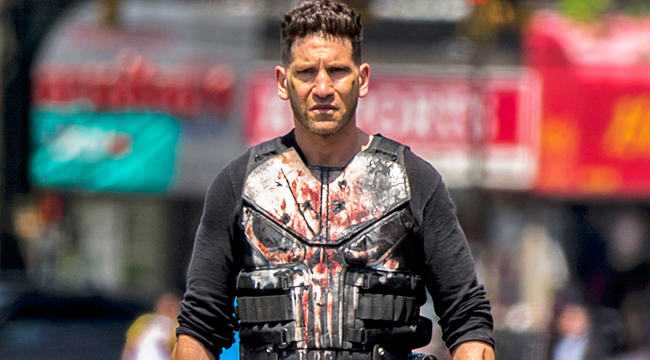
Who is Frank Castle? First and foremost, The Punisher‘s antihero (embodied by Jon Bernthal) is a killing machine. The first season hammered that point home at an odd time (and perhaps, as the character’s cinematic history proves, there’s never a perfect time for this Marvel title to land onscreen). Beyond that, the Netflix series is challenged by what to do with Frank (or his other identity, Pete Castiglione) while attempting to move beyond the core vigilante function of the character. Further, it became increasingly apparent by the series’ first-season end that Frank was ultimately punishing himself, and when the feds officially directed him to pursue a new life, he can’t cope with a clean slate.
Then there’s one of the grey areas still explored by the series: Is Frank good, as he believes, or is he a bad guy? This dilemma causes the series’ writers to offshoot in several second-season directions. Instead of forming an intricately layered story, the end result is unfortunately clunky and full of enough filler to pad out 13 episodes — rather what could have been better streamlined as a Netflix movie in which frenemies Frank and Billy Russo (Ben Barnes) settle their differences (and similarities), once and for all. With that said, the action aspect of the second season (including a bar brawl, a gym throwdown, and firefiiiiights) is actually well-choreographed and quite good. Hardcore fans should be pleased enough on that end, at least.
But let’s get real before continuing. Netflix is steadily canceling its Marvel shows, and The Punisher will likely soon go the way of Daredevil, Luke Cage, and Iron Fist. Before that happens, the streaming service messed up the minds of Frank and other core characters really good. Indeed, there’s a whole lot of trauma to be processed following Frank’s climactic carousel fight with Billy that also involved a gunshot to Agent Madani’s head. The series tried to follow this up while deciding that it might be neat to show Frank’s softer side. And beyond the introduction of Russo’s Jigsaw incarnation, there’s a poorly constructed new villain in the mix. All of this is meant (maybe?) to illustrate Frank’s complex nature, but mostly, the guy ends up confused. It’s sad, and in a season where Frank Castle starts throwing kettlebells at people, no one should be sad. Ever.
(Kettlebells not pictured here, you’ll have to trust me.)
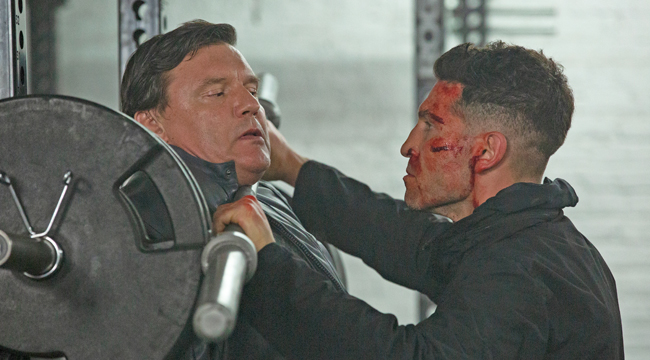
This fight is easily the most satisfying scene of the season. I highly recommend seeking it out as a standalone moment, apart from these identity crises:
Identity Crisis #1: Can Frank be a softie? Right away, Jon Bernthal’s Frank meets his new sidekick, Amy Bendix (Giorgia Whigham, who is appropriately punchy and quickly racking up TV credits), a young woman with a mysterious past. She’s a character who originates in the comics as a teenager who helps Frank recuperate from injuries. The series transforms her into a sort-of surrogate daughter. And this works, for a few episodes. Frank is forced to really reckon with his feelings over his family being killed, and we see the beginnings of a heart-warming dynamic. He teaches her moves with a gun, and we get to hear The Punisher attempting teen speak, and it’s … a little humiliating but humorous. Inevitably, he grows restless and turns into Frank Castle again. He won’t invest the proper energy in her, and neither can the audience.
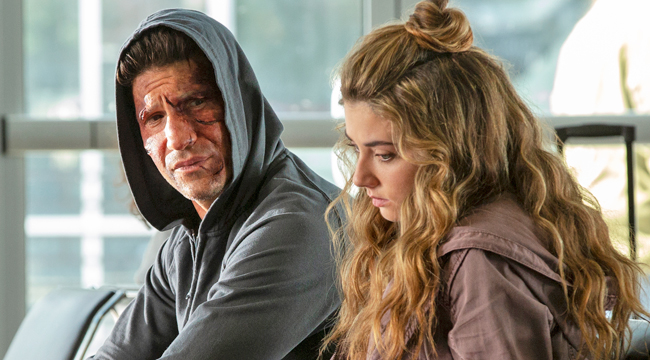
It’s not clear if Frank simply grows bored while behaving in a semi-civilized way — reinforcing his previous admission that he enjoyed Marine life more than a settled, domestic existence — or if it’s more about the writers growing impatient in a quest to halfway flesh-out a new villain. That’s John Pilgrim (Josh Stewart), a right-wing Christian fundamentalist with a violent history and propensities. Pilgrim’s violent past is presumably meant to mirror Frank’s way of living that he can’t leave behind, along with whatever the writers are attempting to say about extremism at any end of the spectrum. It feels like political filler material, so I’ll leave it at that and move onto the real conflict.
Identity Crisis #2: Are Frank and Billy both “bad”? Billy begins the season with intense nightmares about Frank, which makes sense because the pretty boy’s face got sliced up into hamburger meat. Yet Billy doesn’t look even remotely as torn up as he should because (seriously) he got plastic surgery and only has a few facial scars. So there’s the big, obvious metaphor that his mind is a jigsaw, and he’s trying to piece together that the hell he did to make Frank so mad while sorting through psychological trauma. That’s also an extension of last season’s theme of veterans suffering from PTSD, which would ideally avoid taking a simpler route to the dark side. That’s still what happens, though. Billy, as Jigsaw, is all in for mayhem with a team of masked recruits, and they’re robbing places to save money for an army to fuel their cause.
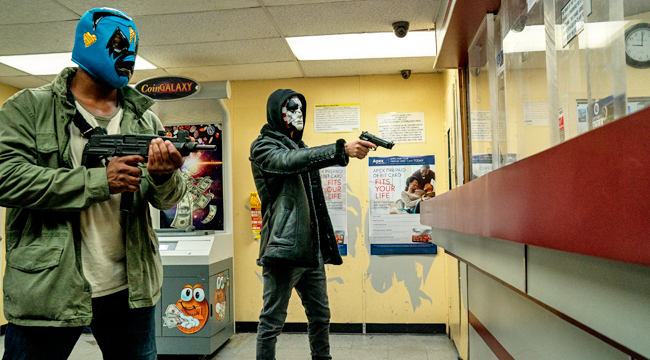
What cause, you might ask? It somehow involves an inspirational speech in which Billy argues that Frank is just like him. And here’s some actual dialogue from this season to emphasize that point:
Frank: “You should have stayed in your hole, Bill.”
—–
Curtis: “What’s wrong with you, Frank? Look at yourself, you’re acting just like Billy.”
—–
Frank: “We’re not the same!”
Billy: “We are not good people, Frank … Me and you, Frankie, we’re the same.”
—–
Frank: “Where are you, Bill?”
Billy: “I am you, Frank.”
—-
Curtis: “I don’t want to have to kill you guys. This doesn’t have to happen. We’re all the same.”
—–
Billy: “You should have stayed in your hole, Frank.”
Poor Curtis. The guy never gets a break. He’s still reduced to cleaning up after Frank and Billy’s feud, and now he’s saddled with the most obvious dialogue.
Identity Crisis #3 Agent Madani’s losing it, as well? The homeland security agent’s wrestling with her own aftermath while reckoning with what happened last season. She’s literally at a standstill when we first see her, apparently unable to step away from the foot of her former lover’s hospital bed. She stares at him, waiting for him to wake up … so that she can taunt him?
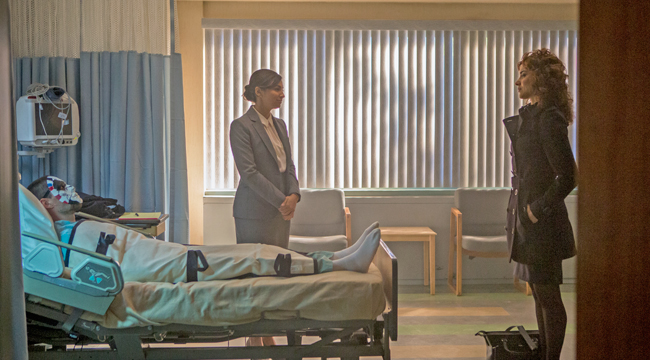
Look, I get it. Plenty of people have chosen the wrong bedmate and have serious regrets. Granted, not all exes are psychopaths that fuel their quests for power and material possessions by making a fortune in the mercenary trade. Not everyone gets shot in the head by their deceptive ex-lover while he’s throwing down on a carousel with his arch enemy, but reducing Madani to an obsessive is weird. She’s also used for a lot of expository dialogue while various characters argue about whether Frank Castle is good or bad, and all of this back-and-forth isn’t as complex as The Punisher source material deserves.
In the end, this season continues to ask the same question – is Frank as noble as he thinks he is? Or is he as evil as Billy? Again, this question could have been compelling to explore in a 90-minute movie, but instead, we get the same question over and over again and diluted with other story arcs that simply take away from the main attraction. Focus on Billy and Frank, bring back Micro (who is absent this season), and add a splash of Madani. It’s too much to ask for a do-over, but I can’t help but wonder if Netflix should have canceled this series before releasing this season, rather than after the fact.
Netflix’s ‘The Punisher’ season 2 will stream on Friday, January 18.






